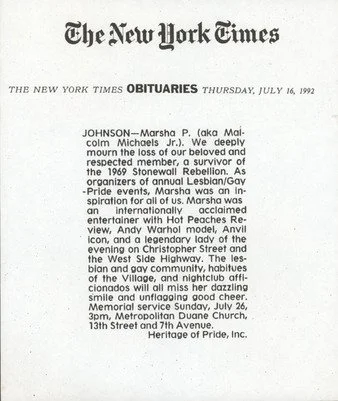"Pay it No Mind" - The Legacy of Marsha P. Johnson
/Marsha P. "Pay it No Mind” Johnson was a leading figure in the New York City gay rights movement of the 1960s and 1970s. Johnson was a transgender woman, drag queen, an advocate for gay and transgender rights, for homeless LGBTQ+ youth and those affected by H.I.V. and AIDS.
Johnson was known as a flamboyant, joyful person, but also a determined activist as a major part of her legacy. The phrase “Pay it No Mind” references what Johnson would tell people who speculated about her gender identity.
Early Life
Johnson was born on August 24, 1945 in New Jersey. She was assigned male at birth, born Malcolm Michaels Jr., but from a young age Johnson enjoyed wearing clothes for girls. She openly expressed herself until she was bullied and sexually assaulted when she was 13.
After graduating from Thomas A. Edison High School, 17-year-old Johnson moved to New York City with just a bag of clothes and $15 — and adopted the name Marsha P. Johnson.
An Honourable Legacy
Johnson’s activism began during the early morning police raid on the Stonewall Inn in 1969. The gay men’s bar was a haven for LGBTQ+ people to socialize safely without being harassed. Since it was illegal to serve alcohol to gay people at the time, the bar was raided for serving liquor without a license–13 were arrested. Johnson, alongside close friend Sylvia Rivera, was a part of the riot and led protests that flooded the streets for the next six days, and here began the gay rights movement in New York City.
Johnson and Rivera led the first gay pride parade on June 28, 1970. This influenced many gay rights groups to form, such as the Gay Liberation Front and Gay Activists Alliance–both of which Johnson called out for excluding transgender people. The two women expressed their anger against the transphobia in the gay rights movement in the early 1970s, so much so that they started their own organization.
Johnson and Rivera both struggled with homelessness for most of their lives, which inspired them to form Street Transvestite Action Revolutionaries, an organization dedicated to protecting transgender youth, specifically transgender people of colour. Though short-lived, the two wanted to provide safety for the often shunned people in the LGBTQ+ community.
“I was no one, nobody, from Nowheresville, until I became a drag queen”
Johnson’s bright personality and colourful outfits captivated audiences. Red high heels, shimmery dresses, and most notably, plastic flowers and fake fruits in her hair—were staples in her wardrobe. Johnson began performing in the drag group Hot Peaches in 1972, in both New York clubs and on a tour in Europe. The theatre group performed their shows in small theatres, highlighting the gay experience in a campy way, written by Jimmy Camicia. The group wore sparkling outfits with platform boots and boas.
In 1975, Andy Warhol included Johnson in his Ladies and Gentlemen portfolio, featuring black and Latin drag queens. With this portfolio, Warhol embraced the identity of the queer and drag community while addressing issues in the LGBTQ+ community at the time.
A Complicated Death
On July 6, 1992, Johnson’s body was found in the Hudson River. She was 46 years old. The police initially ruled her death a suicide, but friends and local activists believed otherwise. This caused major outrage in the LGBTQ+ community–activists and protesters flooded the streets with “Justice for Marsha” signs, calling on the New York Police Department to further investigate her sudden death. The police later ruled her death a drowning by undetermined cause. Johnson’s case was reopened in 2012 and is still open to this day.
Marsha P. Johnson is recognized as a powerful force who made invaluable contributions to gay rights movements in the 1970s, up until her death in 1992. Her joyous personality spread to everyone who knew her.
“Darling, I want my gay rights now. I think it’s about time the gay brothers and sisters got their rights… especially the women.” - Marsha P. Johnson
Kayla Latulippe is a level 3 Professional Writing student at Algonquin College. Though she’s still learning, she feels most powerful when connecting with her indigenous (Mi’qmak) heritage. If she’s not studying, she’s indulging in some kind of art–music, writing, photography, painting, and most notably–drag. She was introduced to Canada’s Drag Race in 2020, which skyrocketed into an unhealthy obsession with all things drag, so much so that she started a fan page. Life is a drag, so we know, but she still makes the most of it.





